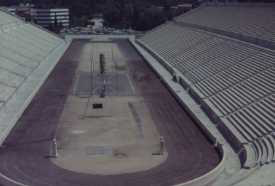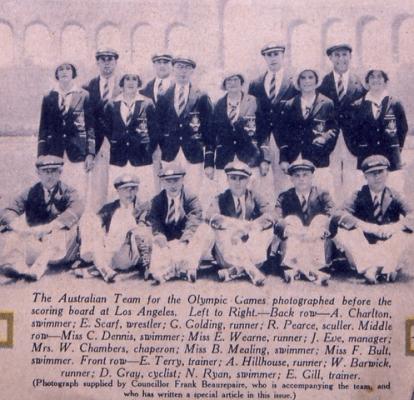Australia has hosted the Olympic Games only twice in its 124-year history—in Melbourne in 1956 and Sydney in 2000—but it has not been through lack of trying.
The long history of the bids by Australian cities to host this multi-nation, multi-sport event is studded with attempts—some fanciful, some serious—and it is described here by Ian Jobling in the first of a series of articles.
The rules and tradition of cities being awarded Olympic Games seven years in advance changed significantly when the IOC announced that Paris and Los Angeles would host the 1924 and 1928 Olympic Games, respectively.
The proposal – an informal expression of interest for Brisbane to host the 2028 Games –
has become, by contrast, a formal presentation through the AOC to the International Olympic Committee (IOC).
Edwin Flack was the sole Australian competitor at the inaugural ‘modern’ Olympics Games in Athens in 1896. Following his success in winning the 800 and 1500 metres track events, the editor of the Melbourne Argus speculated on 11 April 1896 that these “new” Olympic Games “may even in due course offer themselves to the delighted gaze of Melbourne.”
A decade later Richard Coombes, who became the IOC member in Australasia (Australia and New Zealand) in 1906, expressed similar sentiments in a letter to Baron de Coubertin on 19 February of that year: “It is certainly hoped and expected that in due course the Olympic Games will be allotted to this part of the world.”
Expressions of interest in Australia hosting the Games also emanated from the Commonwealth Government in the early 1900s. In an article in the Referee, the journalist stated that at the IOC Congress Lausanne in 1913 “the claims of Australasia for the 1916 Games were put forward but probably that series will now go to Germany.”
Following a request to send a team to Stockholm in 1912 from the newly formed Victorian and NSW Olympic Councils for financial assistance, Prime Minister Andrew Fisher was reported to have stated “… if the Commonwealth government were to take part … the team should be accompanied by an invitation from the Government to the controlling body to hold the (1916) Games in Australia.”
Fisher added that “if Sweden can manage it, surely the same can be done by Australia.”
Although the government did not provide Olympic funds, Coombes pursued the possibility of hosting the Games with Fisher, suggesting that, while in Sweden, E S Marks should convey an invitation on behalf of the government.
Coombes wrote to the PM: “Melbourne or Sydney would be admirably suited for the Games without any expense in the building of stadiums, as both cities have suitable playing grounds that would hold large crowds.” Cabinet decided on May 17, 1912, ‘not to entertain the proposal.’
A further proposal for 1916 came from a syndicate in Western Australia ‘to secure, if possible, the holding of the Sixth Olympiad in Perth at the time of the Trans-Australian Exposition.’ The Chairman of the Exposition, W B Cox, with the unanimous backing of the General Committee, argued that if Perth got “the Olympic Games it would give a good tone to sport in Australia.”
Coombes, editor of The Referee at this time, was optimistic. It appears, however, the Perth syndicate had a limited knowledge of the Olympic Movement and its ideals because their proposed program included reference to ‘professional events,’ reporting “Olympian Festival – full programme of athletic events, both amateur and professional, the former to be as far as possible under the conditions of the IOC.”
The 1916 Olympics were already awarded to Berlin but there were suggestions that Australia attempt to secure the Games of 1920. Coombes answered critics who felt it was ‘too gigantic a concern for the country to undertake’ by stating:
“In all classes of sport in Australasia is not in the rear, and huge concerns have
been carried out here, therefore with the combined assistance of all branches, failure need not be entertained.”
He added, ‘the value to the country of such a gathering can be understood, and the publicity gained by an influx of athletes and visitors from all parts of the globe would be the finest advertisement that Australasia could receive.’
Unfortunately, Coombes could not attend the meeting of the IOC in Stockholm in 1912. He nominated E S Marks, Honorary Secretary of the Amateur Athletic Union of Australasia (AAUA), as his representative to try ‘to get the seventh Games allotted to Australia or New Zealand.” Those 1920 Games were awarded to Antwerp, Belgium.
The first advocates for Sydney to host the Olympics got it dreadfully wrong when a non-Olympic year was proposed. Dr J S Purdy, Metropolitan Officer of Public Health, addressed the Millions Club Luncheon in 1921 and suggested that a huge exposition should be held in Sydney in 1930 to mark the completion of the Harbour Bridge and to exhibit Sydney as a model city.
Purdy was greeted with applause when he said, “Australia had won the right to have the
Olympic Games held within the Commonwealth and no more ideal site or period could be chosen for the great sporting event than Sydney in 1930.”
This proposal was interesting in several respects. The Sydney Harbour Bridge was opened officially in 1932, an Olympic Games year, so the ‘celebration’ would have been appropriate. In response to this proposal, IOC member Coombes, added a pertinent reference to what eventually became the Commonwealth Games, “[there was] nothing to prevent the holding of a mammoth international meeting or, failing that, an Empire meeting in Sydney in 1930.”
It was a prophetic statement – the inaugural British Empire Games was held in Hamilton, Canada in 1930. Sydney, in 1938, was the first Australian city to host these Games.
The inaugural Winter Olympic Games were held in Chamonix, France in 1924. A curious proposal for Australia to host the Winter Olympics was put forward as part of the formal invitation to the IOC in 1948 for Melbourne to host the 1956 Summer Olympics.
A journalist in The Age (24 January) suggested that “the Olympic winter sports, which are always held independently of the main Games, could be conducted at Mt. Buffalo, Hotham or Koscuisko (sic).”
That proposal was unsuccessful but the bid in 1949 for Melbourne led to the first Olympics Games staged in the Southern Hemisphere, which will be the topic of next week’s article.
[Ian Jobling is Honorary Director of the UQ Centre of Olympic Studies at The University of Queensland]











